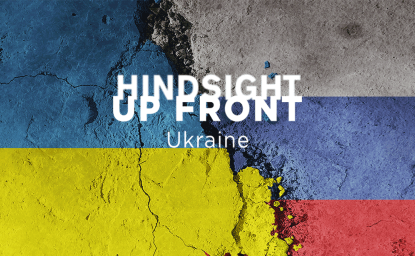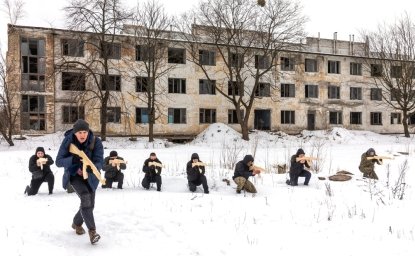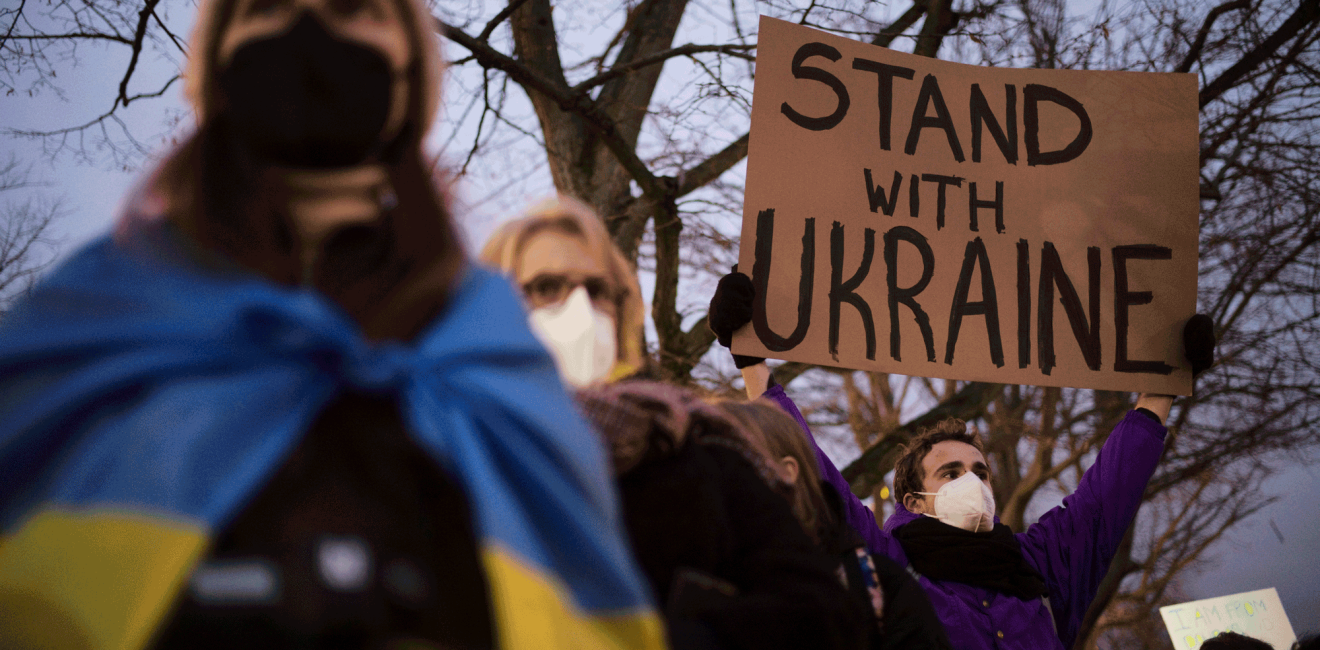Africa
Africa Program
Kenyan Ambassador to the United Nations Martin Kimani delivered a powerful critique of Russian escalation in Ukraine in an address to the U.N. Security Council on Monday night that has gone viral.
Drawing parallels between the Ukrainian situation and Africa’s own experience with borders drawn by outside powers in the aftermath of empire collapse, Kimani emphasized that despite understandable desires “for integration with peoples in neighboring states,” integration by force and expansionism are unacceptable. He called on all U.N. member states to rally in support of multilateralism to find a peaceful resolution to the Russia-Ukraine crisis.
Ghana and Gabon, the other two non-permanent African members of the Security Council, echoed Kenya in emphasizing their support for Ukraine’s sovereignty and expressing concerns over the global ramifications of Russian escalation of the conflict.
Yet a South African government statement, blaming neither Russia nor Ukraine, called for “inclusive talks led by the UNSC” and “enhanced diplomacy.” Nigerian press accounts have underscored the plight of Nigerian and other foreign students in Ukraine. Reportedly, Morocco, Nigeria and Egypt are in the top 10 list for countries whose students are studying in Ukraine, accounting for 8,000, 4,000 and 3,500 students respectively.
Key future ramifications of the invasion include increasing uncertainty in diplomatic and economic relations between African countries and Russia, in a context of increasing Russian influence and engagement on the continent over recent years and a potential dampening impact on the BRICS Summit to be hosted by China later this year, and South Africa’s engagement in it.
Arctic
Marisol Maddox, Senior Arctic Analyst, Mike Sfraga, Chair and Distinguished Scholar, Evan Bloom, Senior Fellow
President Joe Biden's statement on February 24th that there is a “complete rupture right now in U.S.-Russian relations” has stark implications for the Arctic. Long portrayed as a region of peace, cooperation, and engagement, the Arctic is now inextricably linked to the unfolding and further invasion of Ukraine by Russia. All bilateral and multilateral efforts within the Arctic region involving Russia, from the Arctic Council to the Arctic Coast Guard Forum to regional scientific and maritime transportation agreements may be in jeopardy. This is especially evident in the context of the on-going Russian chairmanship of the Arctic Council, which will continue into next year. Arctic nations navigated the headwinds of the Russian Federation’s initial invasion of Ukraine and subsequent annexation of Crimea and ensured, for the most part, but after some delay, that Arctic engagement and cooperation was maintained – and in some areas enhanced. The largescale invasion of Ukraine is such a serious step for all States active in the Arctic that normal modes of cooperation, including those focused on climate change, will likely be reassessed.
Security Implications
The Arctic is a strategic landscape for Russia; the Kola Peninsula is home to Russia’s Northern Fleet, and an important hub for their strategic submarine and second-strike capability. Moreover, Russia uses the Arctic to test and demonstrate its military capabilities, such as in the recent nuclear strategic forces exercise GROM 2022, when the nuclear triad was tested alongside hypersonic and ballistic missiles. If, as some fear, Russia’s invasion of Ukraine spills into other areas, due to a miscalculation, misstep, miscommunication, or purposeful action— to include NATO member or partner states— Russia’s Arctic-based military assets will undoubtedly be drawn into the conflict. The Arctic has strong NATO representation, including the United States, Norway, Denmark, Canada, and Iceland, as well as partner countries Finland and Sweden. The latter two nations have navigated a difficult balance between deterrence and reassurance to maintain practical relations, though Russia’s actions in Ukraine may bring about a re-evaluation of such policies. Two previously planned defensive NATO exercises will commence in the Arctic this week, coinciding with Russia’s invasion of Ukraine, asserting alliance unity as a deterrence against further aggression at a critical moment in history. BRILLIANT JUMP 2022 is scheduled to begin in Norway on February 28th and the Norwegian-led bi-annual COLD RESPONSE 2022, which includes NATO partner nations Finland and Sweden, is scheduled to begin on March 14th.
Diplomatic Implications
“Arctic exceptionalism,” and the qualities that have enabled cooperation to endure in the region despite external tensions, is at risk more today than at any other time in recent history. Russia’s invasion of Ukraine is in direct conflict with the spirit of the Arctic Council (the premier intergovernmental forum for regional cooperation) as outlined in the Ottawa Declaration, and the foundation upon which the Council’s work has been developed and effectuated. Arctic diplomats have a significant challenge before them as they seek to navigate political realities and constraints in their objectives to continue progress in areas of meaningful mutual interest, such as action on climate change, while recognizing and addressing Russia’s norm-breaking invasion of a sovereign nation.
Economic Implications
Ever-evolving sanctions will impact economic development in the region – the full effects are yet to be seen - and could potentially expand to include Russian energy projects. This will likely push Russia closer to China as it seeks non-Western sources of financing for critical Arctic development projects. Chinese reception to such Russian overtures should be analyzed carefully as the Chinese government has its own regional and global interests to consider. Sanctions may also create a surge in illicit trade opportunities for transnational criminal organizations, as Russia seeks alternative means of acquiring certain goods, technologies, or services the country may no longer have access to.
Canada
Christopher Sands, Director, Canada Institute
Canadian PM Justin Trudeau made the following statement last night:
“Canada condemns in the strongest possible terms Russia’s egregious attack on Ukraine. These unprovoked actions are a clear further violation of Ukraine’s sovereignty and territorial integrity. They are also in violation of Russia’s obligations under international law and the Charter of the United Nations.
“Canada calls on Russia to immediately cease all hostile and provocative actions against Ukraine and withdraw all military and proxy forces from the country. Ukraine’s sovereignty and territorial integrity must be respected, and the Ukrainian people must be free to determine their own future.
“Russia’s actions will be met with severe consequences. Tomorrow morning, I will be meeting with G7 partners, and we will continue working closely and quickly with NATO and our allies to collectively respond to these reckless and dangerous acts, including by imposing significant sanctions in addition to those already announced.
“In the face of these attacks on Ukraine, Canada will take additional action to stop Russia’s unwarranted aggression. We continue to stand with Ukraine, its people, and the Ukrainian Canadian community here in Canada. Russia’s brazen acts will not go unpunished.”
Canada this morning evacuated its diplomats in Ukraine to Poland. A great round-up of comments by Canadian officials including former PM Stephen Harper is here: Trudeau promises severe consequences for Russia, Harper says Putin must be punished | National Post
China
Robert Daly, Director of the Kissinger Institute on China and the U.S.
The first thing to notice about China’s official response to the invasion of Ukraine is that Xi Jinping himself has said nothing. The leaders of most other Western and northeast Asia countries have made personal statements condemning Russia’s actions, but Xi has let his Foreign Ministry do the talking.
This is because silence preserves the illusion of wisdom and keeps options open, but also because Xi has already made his position clear. On February 4, on the eve of the Olympics, Xi and Vladimir Putin announced an “unlimited” quasi alliance that would “oppose further enlargement of NATO” and “remain highly vigilant about the negative impact of the United States' Indo-Pacific strategy.” China is not yet guilty by association in Ukraine but, after February 4, it cannot deny all association with Putin’s invasion, which it neither desired nor foresaw. That linkage, and that error, will call Xi’s judgment into question as he heads into the annual Two Sessions meetings soon to convene in Beijing.
China’s Foreign Ministry, meanwhile, is trying to convince Chinese audiences that the war is the fault of the United States and NATO. Spokesperson Hua Chunying states that NATO owes China a “debt of blood” for the bombing of its embassy to Yugoslavia in 1999—a phrase intended to reignite the ire of the Chinese people against the West—and insists that “a key question here is what role the U.S., the culprit of current tensions surrounding Ukraine, has played.”
It is striking that China views an invasion that clearly violates its sacred diplomatic principles through the lens of Sino-U.S. competition, principles be damned. Striking too that, despite Xi’s quest for global leadership, China has not yet attempted to broker peace between two nations with which it has good relations. Expect China to continue its accusations against the West, its equivocation regarding Russia, and its aversion to the risky pursuit of peace.
France and Europe/EU
Jim Hollifield, Global Fellow
France currently holds the six-month, rotating presidency of the Council of the EU, and France President Emmanuel Macron tried to use all his skills of persuasion to defuse the conflict between Russia and Ukraine, with multiple meetings and telephone calls with President Vladimir Putin—all to no avail.
The principal lesson to be drawn from this is that President Putin pays little heed to European leaders or the EU, preferring to deal directly with the U.S., while shoring up his flank with China. President Macron has the ambition to create a common European foreign and security policy, but this now looks more difficult than ever. France and Europe find themselves once again caught between two nuclear-armed super powers, as Europe slides back into a new cold war.
That said, President Putin and the Russians have succeeded in uniting the Europeans in ways that one could only have imagined a few weeks ago—witness how quickly the Germans suspended Nordstream2, something they were reluctant to do for many years. The Russian invasion of Ukraine demonstrates the vital role of NATO in European security, and the dream of a common European defense policy is as far away as ever.
Assuming that President Putin and the Russians succeed in subjugating Ukraine—although a protracted war with many casualties and guerilla resistance in Ukraine is a distinct possibility—the conflict will play out on an economic stage.
The Russians hold a trump card in that they can cut off energy (gas and oil) supplies to Europe, leading to major economic disruptions and another inflationary spike in energy prices. In the longer term, economic sanctions against the Russian government, banks, and other corporations will do major damage to the Russian economy, but this is a price that President Putin and his regime are willing to pay. It will be interesting to see if the Russian people will follow him down this path with great loss of blood and treasure.
The immediate fallout from the invasion of Ukraine will be a humanitarian crisis and a flood of refugees heading east. I hope the EU is preparing for this eventuality.
As President Putin said today, he hopes everyone now is paying attention to him and to Russian demands. He certainly got the attention of the EU, including the U.K. The front-line states of NATO, the Baltics in particular, will be watching developments in Ukraine nervously, looking over their shoulders to the U.S. and NATO for reassurance.
One quick anecdote comes to mind. A few years ago, circa 2018, I was giving a lecture at the Hoover Institution at Stanford and I was hosted by the 98-year-old, former Secretary of State George P. Shultz. I asked Secretary Shultz what he thought of the U.S. ‘pivot to Asia,’ to which he replied sarcastically—great move. “We pivoted to Asia and the Russians invaded Ukraine.”
The moral is that, as a global power, the U.S. does not have the luxury to focus all of our attention and resources on one region/country (China), and that our security and economic interests in Europe remain paramount.
Japan
Shihoko Goto, Acting Director, Asia Program
Japan imposed sanctions against Russia Wednesday, by prohibiting the issuance of Russian bonds in Japan, freezing assets of certain Russian nations, and restricting travel to Japan.
Prime Minister Fumio Kishida stated that "Russia's actions very clearly damage Ukraine's sovereignty and go against international law. We once again criticize these moves and strongly urge Russia to return to diplomatic discussions…should the situation worsen, we'll move quickly to take further action.”
This will hamper Tokyo’s efforts to negotiate the return of the Kuril Islands that have been held by Russia since 1945. Japan and Russia have yet to sign a formal peace treaty after World War II.
Japan imports about 10 percent of its LNG and 12 percent of thermal coal from Russia.
Mexico
Andrew Rudman, Director, Mexico Institute
Mexican President Lopez Obrador (AMLO), during his morning press conference, called for peace, noting that Mexico does not want war anywhere, does not want people to suffer, and doesn’t want civilians harmed. Mexico’s position is in opposition to armed confrontation. He then shifted gears to add that if the price of imported gas rises, we will shift to using non-gas fired electric plants to provide needed electricity.
Foreign Minister Marcelo Ebrard tweeted that he was in contact with the current president of the UNSC (Mexico is a non-permanent member at present) and with the Mexican ambassador to Kyiv. He added that Mexico rejects the use of force and reiterated its call for a political solution to the conflict in Ukraine. He reiterated that Mexico supports the UN Secretary General. Mexico will work with other countries to find a space for dialogue.
AMLO’s comments reflect classic Mexican non-interventionist policies and are certainly not a ringing condemnation of Russia’s actions. This reflects his general lack of interest in foreign affairs, (note his immediate shift to how this might impact Mexico), and his long-standing aversion to foreign intervention of any sort (except when he wants to criticize, for example, the US trade embargo on Cuba).
In late January, AMLO linked the Russia-US dispute over Ukraine to neo-liberalism, implying somehow that neoliberalism was the cause. Other officials, such as the Foreign Minister and Mexico’s UN ambassador have hewed more closely to the international consensus in opposition to Russian actions. AMLO dominates the Mexican news cycle and does not respond well to criticism from outside his government or dissent from within. As a result, and despite its current UNSC seat, Mexico is not likely to play a particularly active or influential role on this issue.
Middle East
James F. Jeffrey, Chair, Middle East Program
The enormity of the Russian attack, not just on Ukraine but on the long-term global security order, is increasingly clear among states in the Middle East region, and puts pressure on the ‘hedging’ between the U.S. on one hand and Russia and China on the other, commonplace in recent years. Some hedging can still be seen in reluctance to call out Moscow by some capitals, but the dangers to the region of an entire world in limbo are immense. Thus if the U.S. maintains its so-far smart policies to make Russia pay economically and diplomatically for its aggression, regional states will eventually rally behind Washington. Turkey is most affected by this Russian move and thus its reaction is clear and strong. Iran has clearly sided with Russia, which will have repercussions in the U.S. and particularly Europe.
Russia’s FSU Neighbors
F. Joesph Dresen, Senior Program Associate, Kennan Institute
The condemnation of Russia’s actions have been swift and decisive from several, but far from all, of Russia’s neighbors who were once part of the Soviet Union.
The Foreign Ministers of the three Baltic nations of Latvia, Lithuania, and Estonia issued a joint statement condemning Russia’s attack on Ukraine.
Individually, the president of Latvia and Lithuania, and the Prime Minister of Estonia, each issued their own condemnations of the attack, employing the hashtag #StandWithUkraine.
The presidents of Georgia and Moldova likewise condemned the Russian attack, and the president of Moldova committed to accepting refugees from Ukraine. Over 4,000 crossings have occurred already.
There has been no official statement yet from the governments of Armenia, Azerbaijan, or Central Asia (Kazakhstan, Uzbekistan, Kyrgyzstan, Tajikistan, or Turkmenistan).
Belarus is actively supporting the Russian invasion.
South Korea
Sue Mi Terry, Director, Hyundai Motor-Korea Foundation Center for Korean History and Public Policy
South Korean President Moon Jae-in said that South Korea would join international sanctions against Russia and expressed regrets over Russia’s attack on Ukraine, noting that “the use of armed forces causing human casualties cannot be justified under any circumstances.” South Korea, however, said it is not considering adopting unilateral measures. From Seoul’s perspective, the Ukraine crisis has created troubling new realities for its economic and strategic security.
South Korea is cognizant of how North Korean leaders will view the Ukraine crisis. To the North, the lessons of Saddam Hussein or Iraq or Muammar al-Qaddafi of Libya couldn’t be clearer: Leaders who give up nuclear weapons programs are at serious risk of being overthrown and killed. That lesson is only reinforced by the current crisis between Ukraine and Russia. Watching the attack on Ukraine, Kim Jong Un can only calculate that if Ukraine still had its nuclear weapons, Russia would not dare to attack it, which will make him all the more determined to hold onto, and even expand, his arsenal of nuclear weapons and missiles.
In the short-term, it is quite possible, even probable, that the North will take advantage of the U.S. being distracted in Ukraine to launch provocations or aggressions on their own. The North could even be further emboldened to conduct an ICBM or nuclear test, knowing that Russia is less willing to cooperate with further action against North Korea at the UN. South Korea also will be concerned that, with Russia-Ukraine conflict taking all the bandwidth in Washington, the Biden administration will not be able to prioritize the North Korean challenge in the coming months.
South Korea has other causes for concern, including the impact on the global economy of the sanctions that will now be imposed on Russia. Supply chain disruptions and price spikes in international markets will be passed onto South Korea. Russia is South Korea’s 12th largest trading partner; South Korean exports containing advanced U.S.-developed technological components could be banned for sale in Russia. South Korea will also face rising energy and food prices due to the possibility that flows of Russian oil and natural gas may be interrupted or curtailed.
If the U.S. cuts Russia from the SWIFT financial network, this could also devastate Russia-South Korea trade, especially Russian energy sales. It could also undermine the South Korean automotive industry’s presence in Russia and jeopardize South Korea’s ambitions to sign a free trade agreement with the Eurasian Economic Union. South Korea has roughly 13 companies active in Ukraine and 40 companies in Russia.
Beyond the short-term economic impact, South Korea will be concerned about the long-term implications for its security. South Korea understands that it is a treaty ally of the United States and Ukraine is not, but it will nevertheless be watching carefully how the U.S. and NATO respond to the Russian aggression. South Korea will be reassured if they see the West mobilizing a massive response to send a signal that aggression does not pay. If, however, Putin wins a swift victory and the West does not manage to impose heavy costs on Russia, that will be of great concern to South Korea, and debate about the credibility of the United States as a security guarantor will increase.
If U.S. power is revealed as hollow and the international rule of law erodes, South Korea will be tempted to build its own nuclear arsenal. It might even lean more toward Beijing in the complicated calibration it tries to achieve between China (its largest trade partner) and the United States (its primary security partner). But any realignment is unlikely in the short term, with Korean public opinion turning more anti-China and particularly if a conservative candidate who is critical of China wins the presidential election on March 9th. Nevertheless, the stakes are high in the Ukraine crisis—and South Korea is watching closely.
South Asia
Michael Kugelman, Deputy Director, Asia Program
Pakistani Prime Minister Imran Khan happened to be in Moscow when the invasion was launched. He met with Putin today for a prescheduled meeting on bilateral relations. The Prime Minister’s Office then released a statement that included this:
“The Prime Minister regretted the latest situation between Russia and Ukraine and said that Pakistan had hoped diplomacy could avert a military conflict. The Prime Minister stressed that conflict was not in anyone’s interest and that the developing countries were always hit the hardest economically in case of conflict. He underlined Pakistan’s belief that disputes should be resolved through dialogue and diplomacy.”
A statement made by India’s UN Ambassador TS Tirumurti last night included this: “The situation is in danger of spiraling into a major crisis. We express our deep concern over the developments, which if not handled carefully, may well undermine the peace and security of the region…We call for immediate de-escalation and refraining from any further action that could contribute to a worsening of the situation.”
Both Pakistan and India are in a difficult diplomatic spot. Pakistan has deepened partnership with Russia in recent years, while India has a longstanding relationship with Moscow going back to the early Cold War days. They will hesitate to criticize Russia, though we can expect some light criticism if the invasion is expanded.
India is in a worse bind than Pakistan given that it has a close and growing partnership with Washington. Indian silence won’t damage relations with Washington, but it does mean India will likely face increased pressure from Washington to reduce its arms imports from Russia (India has already reduced these imports in recent years).
India’s interests could be negatively impacted by the Ukraine crisis because it may lead to stronger relations between Russia and India’s rival China, and because it could distract Washington and its Western partners from focusing on an Indo Pacific policy that is strongly supported by India because of its focus on countering China.

Polar Institute
Since its inception in 2017, the Polar Institute has become a premier forum for discussion and policy analysis of Arctic and Antarctic issues, and is known in Washington, DC and elsewhere as the Arctic Public Square. The Institute holistically studies the central policy issues facing these regions—with an emphasis on Arctic governance, climate change, economic development, scientific research, security, and Indigenous communities—and communicates trusted analysis to policymakers and other stakeholders. Read more

Explore More
Browse Insights & Analysis
Hindsight Up Front | Ukraine

Wilson Smart Take: The Historical and Global Significance of Russia's Invasion into Ukraine


